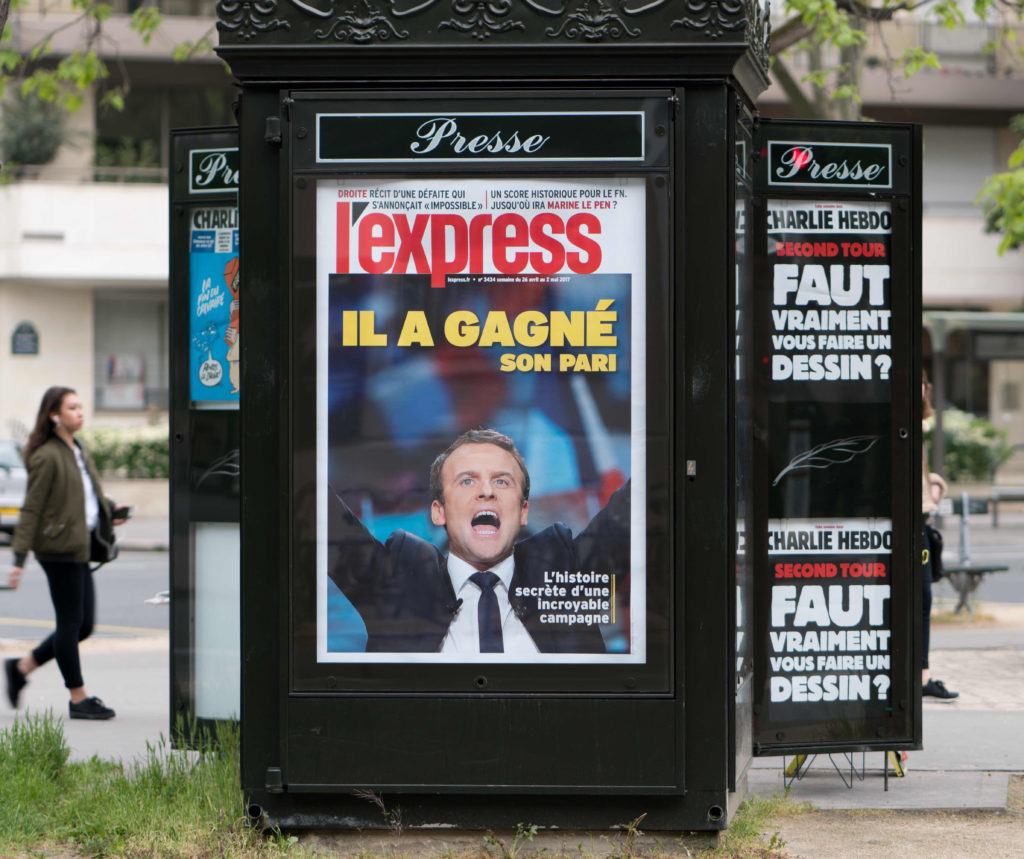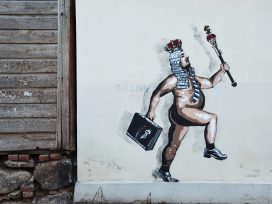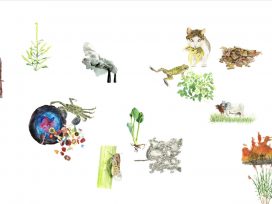Once again, France has surprised us all. Two movements – En Marche! and La France insoumise – that were set up outside the traditional political parties have seen off what was the Socialist Party of François Mitterrand. Following in the footsteps of Jacques Delors, Emmanuel Macron is the youngest French leader since Napoleon Bonaparte. But it was only a minority that voted for him: fewer than twenty per cent of electors in the first round and barely half in the second. This is a sign of the country’s acceptance of its own diversity, a sign that political debate is alive and well in France. Public opinion will now judge the government on its ability to relaunch the European project and, at the same time, succeed in creating jobs right across the country.
Stormy weather over France
In any democracy that is perceived as a service provider, a vote is as much an expression of an individual demand as it is a civic commitment. There is a section of the population – often made up of the most vulnerable – that will buy into absurd nationalist and isolationist arguments, forgetting that the reactionary right wing has always been associated with murderous ideologies and not with efforts at social advancement. The Front National (FN) has radicalized the Right and withdrawn it from the centre, in other words from that part of the political spectrum that is the sine qua non for winning elections. Emmanuel Macron indirectly benefited from the turnout for Jean-Luc Mélenchon and the collapse of François Fillon. In the European context, French politics has moved in a direction typified by the following statement, made by Macron in January: ‘Europe is not this ultra-liberal vision of a mere common market … this European Union is a Europe that protects – in security and immigration – and that to this end must develop a common asylum policy and properly safeguard our European borders.’
In rather more tragic tones, Mélenchon maintains that society is destroying itself – hence the need for solidarity and alternatives to the commercial individualism that has taken hold of societies for the last two centuries. However, the success of the anti-Europeans, in particular Mélenchon, lends some credence to the view that a social conflict is underway, a war waged by the rich against the young and the poor. When he was last a candidate, five years ago, Mélenchon raised expectations amongst young people. Attracted by his pedagogic discourse on politics as it ought to be, many of them abstained in the second round. But his insistence on a radically anti-globalist stance renders his criticisms ineffective and his electorate inaudible.
It is, of course, unacceptable that Marine Le Pen should have received the support of 30 per cent of the vote in north-eastern France and the Mediterranean coast. Voters on the Atlantic coast and in the cities have resisted the Front National, but there too its voter-base is increasing. Had Mélenchon not prevented the Front National from winning a monopoly of the popular vote, the FN would have had over 11 million voters and have emerged from the first round in the lead. The voice of protest in France is still divided. But it is a majority nonetheless.

L’express headline advertised in Paris on the day before elections. Image: Lorie Shaull
A hole in the Republican pact
So is Macron’s victory illusory in some way? His speech of thanks on 23 April offered an outline of his political stance. Speaking about humanist solidarity, there was one word that kept occurring: visage (face). The reference was as much to the face of France as to the face of the future, or those new faces that would play a role in it. As he concluded his speech, he spoke of ‘the face of renewal, the face of hope for France’. He was talking about personal responsibility. It is Emmanuel Macron’s aim to address each member of the crowd of fellow-citizens individually, and to claim to be ‘a president who protects, transforms and builds, a president who enables those who want to create, innovate, show enterprise, or work to do so more easily and more rapidly, a president who, through schooling, health, work and solidarity, will help those who have less, who are more fragile or whom life has treated harshly’.
The electoral map of the country has undergone a transformation, wiping out what remained of the Socialist party’s hegemony. The erstwhile bastions of lay radicalism, of dechristianized socialists and communist syndicalists (the south-west, Brittany, the Paris region) vote for Mélenchon, whereas the Front National did well in frontier regions and in the major eastern and south-eastern areas that have undergone deindustrialization with high levels of youth unemployment. Gentrified town centres voted for Macron, putting Mélenchon in second place, or in first place, as happened in Lille.
Macron follows in the tradition of Jacques Delors, but he must win back the terrain that was captured by the FN. This is all the more necessary given that Mélenchon’s supporters have made clear their mistrust, in both social and ecological terms, of any unsustainable financial globalization, and they will try to prevent Macron from governing: the campaign for elections to the Assemblée is already underway.
Zeev Sternhell has pointed out that the FN is heir to a counter-revolutionary tradition and that France has given birth to two opposing political traditions:
The FN, like various other groups and trends on the intellectual extreme right, are part of the continuing tradition of a European and French line of reasoning that dates back to the turn of the twentieth century, when the anti-Enlightenment tradition that began at the end of the eighteenth century with Johann Gottfried Herder and Edmund Burke, came down from its lofty heights into popular culture […] For the FN’s militants and cadres, an individualist vision of the nation is a long-term and deadly threat, not only to France but, according to Marine Le Pen, to civilization itself. The same is true elsewhere in Europe. Once again, it is France that is setting the tone. The FN is the spearhead of the extreme right in Europe. But let us not forget that the Catholic base of ‘Lepenism’ is also shared by republican conservatives and the hard right.
There should therefore be no compromise with the FN – a view shared by Audrey Pulvar:
Can fifteen years of upset around the world really have been sufficient to have destroyed whatever desire we might have had to become one people, living in a country with a multi-ethnic population? Or is it the case that the poison of hatred that has filtered down to us has just taken its time to surface? Has it proliferated over marked by the destruction of political thought and the discouragement of hope?
Debate between the two rounds of the election pulled no punches. It is worth noting that the towns where Le Pen scored lowest are the same ones that saw the highest proportion of the population turning out to demonstrate after the Charlie Hebdo attack on 11 January 2015. Hervé Le Bras explains:
The towns, especially the most powerful ones, have become points of contact and exchange with the world. Those that are the most important closely resemble those ‘global cities’ … Consequently their residents wish to preserve France’s opening up to the world and to Europe in particular. The important point is that, of all the candidates, only Macron stood up for Europe without imposing any unrealistic conditions on how it might be changed.
A place for everyone: democratic virtue put to the test
In 1944, Karl Polanyi stated that capitalism was doomed to suffer serious crises because, if it was to evolve, it was conditional upon a variety of social skills prior to its existence that it would destroy. The idea of giving freely and the notion of reciprocity, for example, constitute social behaviour that is dependent neither on the market nor on self-interest. The growth of towns and cities concentrates wealth in a limited number of places around the planet. Because of the mobility that some populations around the globe have managed to attain, families and towns or work communities are in danger of disintegrating. They resist being transformed into ‘products’. Everyone strives to grasp the opportunities that enable us to live, but we are trapped in structures that are uncontrolled and uncontrollable. All the problems of everyday experience converge to blame such fears on the way we organize ourselves, on our appetite for wealth and on social struggles.
French social systems have cushioned the effects of the phenomenon whereby the ease enjoyed by the super-rich contrasts with the long-term stagnation of income for the middle classes. But that is not enough to stem the anger of the least mobile, whose income remains frozen. France must adopt a strategy of ‘flexisecurity’, the effects of which have been studied by Bernard Gazier. It calls for rethinking welfare in a way that is designed to act as a shield against the risks that everyone has to face, and to make provision for retirement without neglecting the vagaries of life that people may encounter, or failing to take their geographical location into account.
‘Certain changes, often those that are among the most important and risky, involve events of a personal nature (marriage or other partnerships, separation, illness, birth, etc.) and events of a professional nature (losing a job or being given one, training, re-training, etc.). The general framework that we are dealing with here is thus the systematic, negotiated organization of change. … One of the possible, and in our view increasingly necessary, functions of any dialogue about territorial social support is representation for those who are isolated; and by that we also mean employees of small companies as well as short-term employees, such as temps, freelancers and people on zero-hours contracts.’
Some communes are leading the way by seeking employers that are linked to globalization. Sevrey, near Châlon, has succeeded in attracting Amazon. Carhaix is playing host to a large dairy for China. In addition to an investment of several hundred million euros, the factory secures the continuity of an activity that is crucial in this vulnerable agricultural area. Laval supports centres for research into 3-D imaging and the design of simulation systems for military or civilian use. We still have to try to understand why it is that areas rich in vineyards, high-quality agriculture or tourist centres continue to express resentment of urban areas and vote for the FN. The experience of the gap separating them from the mobile, connected world, the resentment of people who are banished to the fringes of the world of connected leisure pursuits and entertainment for the jet-set are important factors, reminding us that voting is, after all, an individual act.
In France, where political expression is a central aspect of shared existence, the hopes that derive from fifty years of peace and growth have just faded away. The concentration of wealth in just a few areas of the territory is destroying the feeling of belonging to a national collective. This would be all the more the case if France were to be swallowed up in Europe… Occupation of public spaces, the creation of alternative and spontaneous movements, networks of activists – all these have become a familiar part of everyday life, often with the addictive involvement of social networks. But how do you get from the experience of this kind of networking to any real kind of transformation? Today, this question is of crucial importance and lies at the heart of a range of political experiences: the candidates’ websites were crucial drivers of their campaigns. Jean-Luc Mélenchon videos racked up 13 million views on YouTube. Over 400,000 people who logged on to the site during the campaign were then asked to say how they would vote in the second round.
Communication is no longer one-way and representatives are turning into local delegates. Opinions can shift from resignation to engagement and possible solutions and innovative measures are subjected to permanent comparison. Macron will not be able to count on having a majority of compliant, unquestioning supporters. Members of the parliament and ministers will have to demonstrate their credibility every day. The need for concrete thought about day-to-day existence in a globalized regime will be imperative. Whatever community support networks no longer provide will have to be reconstructed through online and face-to-face social support for today’s generations. Europe can prove to be the laboratory for a century undergoing transformation if it takes seriously the day-to-day lives of its inhabitants.
As well as the political majorities, the entire social pact is undergoing crisis. Emmanuel Macron and his entourage would be making a grave mistake if they were to content themselves with a macro-economic political approach. The new presidency must deal with the question of how the democratic debate is to happen, move towards participatory decision-making and reinforce public services, since their weakening is what has been behind reactionary voting. If, on the other hand, Macron, having been elected, were to forget all about his 1 May speech about the ‘new republic’, and instead to shut himself away in France’s palaces and content himself with proclaiming his powers, then his honeymoon period will be very short indeed.









